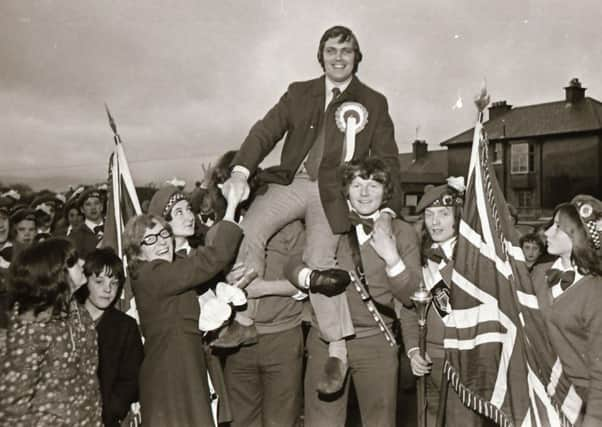Glen Barr didn't want to be involved but lack of unionist leadership drove him to it


He was associated with the leadership of the UDA in the mid/late 1970s and was also the de facto leader of the Ulster Workers’ Council Strike of May 1974.
Ian Paisley sometimes gets the credit, but Barr was the real leader and planner of that stoppage.
Advertisement
Advertisement
He was also one of the few Loyalist leaders - with Hugh Smyth and David Ervine - to achieve some political success, and this was really because of his background in trade unionism (though he joked that it was his good looks!).
When I interviewed him in his quarters on the Glendermott Road in November 2013, I was struck by how growing up in Derry/Londonderry he talked of living in a ‘mixed ghetto’: Catholics and Protestants lived in the same poverty, the two up/two down house with the outside toilet, and he saw no difference between them.
He was really a sophisticated working class politician who was driven in May 1974 as much by contempt for the landed gentry and the politicians who dominated Unionist politics as much by his opposition to Irish input in Northern Ireland through the Council of Ireland.
He said at a conference I organized at Queen’s University Belfast in May 2014: ‘The age-old problem we’ve always had is that the ordinary working class were used again.
Advertisement
Advertisement
‘They were brought out of the rabbit hole and when the dirty work was done and over, and all the plaudits had been handed out, they were shoved back into the rabbit hole again.
‘That’s the difficulty of being associated with the Loyalist paramilitaries. You get all these “great” people as they did in 1974, joshing up against you to get their photograph taken alongside you.
‘But if you’d had dared mention the fact you were thinking of marrying one of their daughters, they would run a mile.’
It was personally interesting to me that even though my grandfather Paddy Devlin was Minister of Health and Social Services in the Sunningdale Executive which was destroyed by the Strike, Barr built up a political and personal rapport with him to the extent that they became friends and contemplated forming a new Left wing party (Barr even signed Paddy’s nomination forms for his disastrous European Election campaign of 1979!).
Advertisement
Advertisement
Barr said: ‘We were two of a kind in many ways. It just so happened we were born on different sides of the track’. He knew he would be able to cultivate a relationship with Devlin when he attended Stormont debates in the years following the 1975 Convention Election, when ‘you could see the divisions starting to emerge, political and social divisions within the Executive itself’.
Barr wanted this to develop along Left/Right lines, and it also showed that he was a non-sectarian political figure who also came up with constructive plans and documents such as Beyond the Religious Divide (1979) which argued the case for Northern Irish independence.
Such a document went into some detail on how the society would be based on an American system with a written constitution and Bill of Rights.
Though outlandish, it did reflect how Barr was involved in initiatives which might help move Loyalists away from violence and towards some form of political thought.
Advertisement
Advertisement
He also did a lot of work on First World War commemoration with Irish politician Paddy Harte, again reflecting how willing he was to cross the divide himself.
At the Queen’s conference on the UWC Strike in May 2014, Barr explained everything about his life in a lucid way, pointing out how he didn’t want to be involved in politics but that the lack of leadership from other Unionist politicians forced him to get involved.
That’ still a prevalent theme, but it was more than that for him; he was explaining his credo, and also why he believed May 1974 was ‘the last time that the Loyalist people held their head up, the last time they had got a lift from the depravity that they felt themselves in’.
Anyone who was there felt quite fortunate to be witnessing an exceptional talk and tour de force from a man who had, in the end, thought it through.
Dr. Connal Parr, BA, MA, PhD
Vice-Chancellor’s Research Fellow in the Humanities
Northumbria University
Tel: 07891 849 265